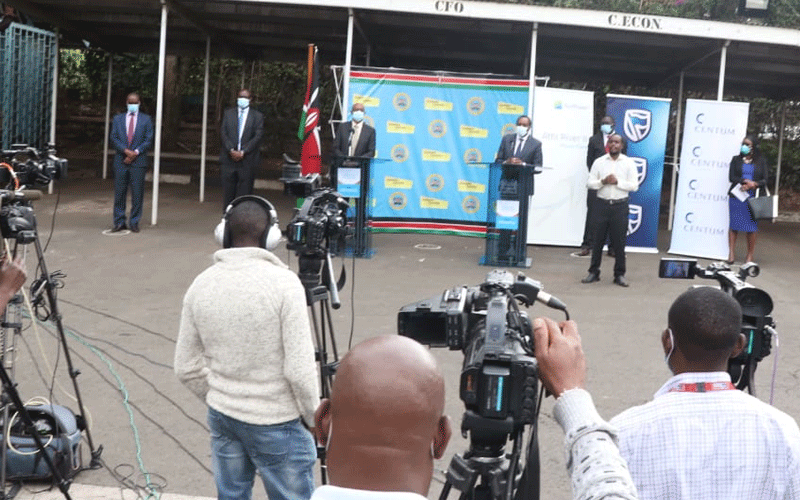Reporter recounts plugged travails in Corona coverage

The last few months have been surrounded by uncertainty and relentless streams of coronavirus pandemic news that can be overwhelming.
But for journalists such as Zainab Said, who are reporting on the pandemic, they cannot afford to switch off or feel drained despite the pressure that comes with the nature of their work.
“When I was informed that I would be a frontline reporter covering the Covid-19 I did not give much thought into it or how it would impact myself and my loved ones.
I thought it would involve going to a press briefing by the Ministry of Health and ensuring I get right the Covid-19 jargons such as differentiating between quarantine and isolation, but it was more than just that,” says the Nairobi-based Milele FM journalist.
Covering the pandemic is more than just feeding the mass with facts and figures, Zainab says. For her, it’s about informing the mass of the good, bad and everything in between.
It’s about being at the center of it all—being relentless despite fearing for your life as a frontliner.
“I have covered stories of how diabetic people are having a hard time accessing their much-needed medication, yet they are highly susceptible.
I have also done a story of the pandemic’s apparent toll on street families and fear and anxiety faced by nurses at Mathare Mental Hospital over possible coronavirus outbreak in the facility,” she tells People Daily.
In the last few months, journalists have been compelled to adapt to severely altered working conditions.
She and her colleagues, she says, have had to face the daunting and sometimes life-threatening tasks daily. Like when she had a one on one interview with a Covid-19 patient.
“I was chasing a story at the Kenyatta University Referral Hospital, when the doctor in charge asked if I was willing to interview a Covid-19 patient.
Despite their assurances of giving me protective gears, I was still hesitant and I remember calling my mentor for advice since I knew it would mean opening up myself to any eventualities.
After half an hour of contemplating about it—frightened and with the knowledge of the disease’s contagious nature— I agreed to do the interview,” narrates Zainab.
Facing the reality
Dealing with anxiety and personal fears can leave a strong impact, especially for those on the frontline of the story, including journalists.
But what was going through her mind, as she put on the protective gears ready for the interview?
“I was so nervous and anxious and it somehow triggered my periods to come a week ahead of time.
Honestly, I was not prepared and the periods came heavy and the only thing I could think of was how not to spot on the personal protective gear.
The thought of handing over a bloody kit did not sit well with me,” she laughs as she reminisces about the incident.
In what Zainab describes as a well-coordinated movement, she was guided into the hospital ward with 361 Covid-19 patients.
From their eyes, she could read a combination of emotions, from homesickness to untold anguish, especially from the elderly patients.
“I locked eyes with a little boy probably four-years-old, dressed in a hospital scrub with a face mask.
He seemed disconnected from the harsh reality. With a faint smile on his face, he waved at me from a windowpane and I waned back.
This made me forget my anxiety and the bloody situation, and for a moment, I was filled with this warmth that gave me the courage to take the next step,” she recalls.
Job security is also another issue affecting the mental health of journalists, many of whom are freelancers and not entitled to statutory sick pays.
Despite the pay cuts subjected on most journalists’ earnings by their respective employers due to the Covid-19 pandemic and the nature of her work, she says it is important for her not to burn out.
She says, “The virus is likely to be with us for a while, we are in this for the long haul.
Therefore, it is important for us to work tirelessly to keep the people updated and help them make a sense of the pandemic that has engulfed all of us.
As we do our parts, I urge all employers to play their part too and support their employees during this time.”
Effects on careers
Speaking to us anonymously, one freelance sports journalist who has lost most of his work during this period said, “ I have lost half of my usual income because of cancelation of most sports events.
Now, I am forced to use the limited money I earn to cater to my needs. These are tough times for most people, so please do not shy away from seeking help where needed; talk to someone about your issues. It is important that we all remain mentally and physically healthy.”
Beatrice Wanja shares the same sentiments. She has been forced to work from home and has not left home since March.
“I live in a highly guarded residence that has been on lockdown since March. That, and the blanket cancellation of most events, has forced me to work from home, which can be challenging.
I feel like there is some sort of disconnect with my work, especially when I am working on human interests kind of stories since I do phone interviews.
It is not the same as one on one interview where you get to connect and have a feel of the story you are working on,” she says.











